Four Minneapolis officers were accused of excessive force — and now train other police
The Minneapolis police officer who fatally shot Amir Locke and until recently led MPD’s use-of-force training is not the only trainer whose record has raised concerns over the department’s commitment to changing its culture.

Four Minneapolis police trainers were accused of using excessive force in civil lawsuits the city settled before they received their current assignments, according to a review of federal court documents.
One police trainer allegedly struck an disabled man in the head. Another allegedly beat and falsely arrested a Black man who repeated a question. A fifth officer, who now reviews use-of-force incidents, allegedly took part in the assault of a man who claimed he nearly died. That lawsuit was settled for nearly $1 million.
The lawsuits were settled without a finding of fault. And many of the allegations date back a decade or more. But as the Minnesota Department of Human Rights tasks the Minneapolis Police Department with overhauling its culture and accountability processes — including uses of excessive force that disproportionately impacted people of color — advocates for police reform say these officers’ leadership positions raise concerns over the department’s commitment to change.
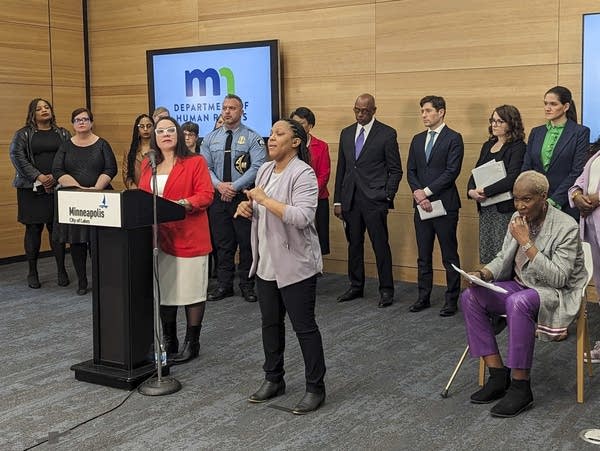
The two lieutenants who oversee all of the department’s training are Lt. Troy Carlson and Lt. Adam Lepinski. Carlson has been disciplined twice for using excessive force. In one of those cases, the city paid $19,500 to settle allegations Carlson slammed his knee into a man’s face while the man kneeled with his arms raised. Lepinski has five open complaints dating back to 2022. It’s not clear what the nature of those complaints are. In 2018, the city paid a man $25,000 to settle allegations Lepinski pepper-sprayed him for no reason.
Lawsuits against at least seven officers assigned to the training division as of this spring have collectively cost Minneapolis taxpayers nearly $2 million in legal settlements. Two of these officers are also currently being sued in federal court. The division includes a total of 14 sworn officers.
“This is absolutely not how you change a culture,” said Michelle Gross, president of Communities United Against Police Brutality and a longtime critic of MPD. “Why would these particular individuals be selected to provide the training that is supposed to change this culture?”
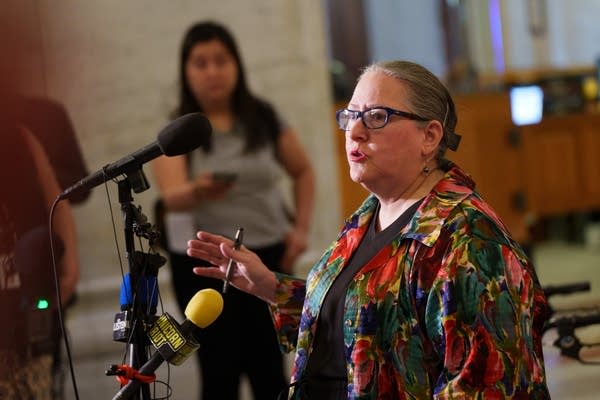
Chief Brian O’Hara said in an emailed statement that it is MPD’s “true mission to meet the community’s desires for meaningful and lasting police reform.”
He said “the mere existence of allegations, lawsuits, settlements or complaints should not be mistaken for, or used to suggest, proof of misconduct,” but acknowledged that trust in how allegations and complaints were previously investigated is low. He said he has faith new processes will build confidence that allegations are thoroughly and fairly investigated.
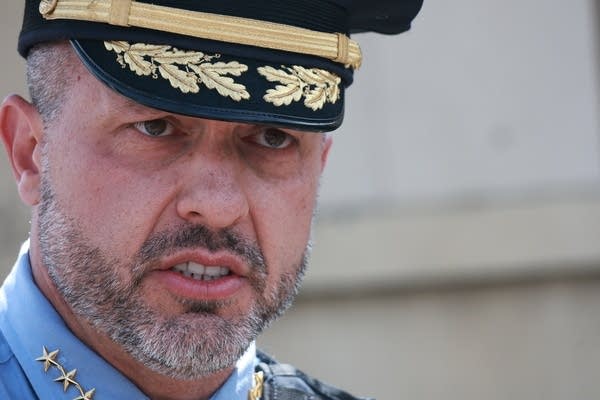
“MPD employs people — people who learn through experience and continue to grow over time,” he said. “While I cannot speak to how officers were previously assigned, my responsibility as chief moving forward is to ensure that assignments, particularly to important roles like training, are made based on a range of factors, including an employee’s skill and expertise, performance evaluations, past service as a police officer, and a review of their disciplinary history.”
MPR News’ examination of the training division comes as MPD works to retrain the entire department on new use-of-force policies, as mandated by a state settlement agreement. The analysis follows revelations last month that the officer who fatally shot Amir Locke in 2022 had been leading that training for the department. O’Hara announced soon after that Sgt. Mark Hanneman had been reassigned, citing the “importance of maintaining community trust.”
Still, the presence of other officers in the training unit who have been accused of violating the civil rights of residents, including several people of color, is troublesome for advocates who have long called for significant police reform.
Justin Terrell, executive director of the Minnesota Justice Research Center, said some of these appointments demonstrate “a missing filter in decision-making in MPD and in the city.” Terrell has also served on the Minnesota Peace Officer Standards and Training Board and as a member of a Minneapolis civilian police oversight group. He said he encourages “both the mayor and the chief of police” to adopt a better filter.
“Leadership is responsible for applying wisdom in how they select their trainers and building trust between the department and the community,” he said. “And when they make decisions like this that just raise more questions and concerns, they are damaging the work that they are doing.”

“I absolutely believe that these officers are good choices for trainers,” Lt. Sherral Schmidt, head of the union that represents Minneapolis police, said in an emailed statement. “They are extremely committed to their roles as trainers and are viewed as leaders by their peers. Many of them have spent thousands of hours in training so they could acquire the necessary skills and certifications to train others.”
Addressing misconduct is crucial, she said, but “judging an officer’s fitness for training based solely on past complaints would be a disservice to the department and the community.”
Police officers enjoy broad legal protections for their on-duty activities, including qualified immunity, a legal doctrine that protects police and other officials from civil lawsuits unless they knowingly violate clearly established law.
Except in rare occasions, the city also indemnifies officers named in civil rights lawsuits, meaning the officers don’t pay settlements or attorneys fees out of their own pockets. Police reform advocates have pushed for ending that immunity and forcing officers to carry professional liability insurance — as doctors do — to increase accountability.
Andrea Headley, associate professor at the McCourt School of Public Policy at Georgetown University, said she finds settlements, repeated complaints and disciplined behavior “definitely concerning.”
Headley’s research has focused on police training, police-community relations and police use of force. Just because an arrest or use of force was legal, Headley said, “doesn’t mean that it wasn’t harmful to the individuals.”
She said positive police-community relations and the absence of allegations should be an important factor in determining promotions to leadership positions, especially in police departments that are trying to repair relationships and prepare officers to uphold the community’s standards.
Lawsuit payouts range from $200 to nearly $1 million
The size of settlements the city has paid in lawsuits involving officers now or recently in the training division range from $200 to nearly $1 million.
When asked over email about settlements on the lower end, police union leader Schmidt said the city’s “repeated willingness to settle lawsuits without defending the actions of its officers is extremely frustrating” and creates a perception of wrongdoing that “erodes the morale” of police officers.
“Our officers deserve due process, not to be scapegoated in legal agreements where they have no voice,” she said.
Attorney Paul Applebaum, who has filed civil rights lawsuits against police departments for almost 30 years, often on behalf of people of color, said smaller settlements are not indicative of a weak case.
He said what others might see as a “relatively small amount of money” being offered by the city can be a lifesaver for low-income plaintiffs who may not be in a position to hold off for two and a half years until a case is tried and resolved.
“I’ve sat through I can’t tell you how many settlement conferences with judges who are like, ‘Look, $7,500 is a lot of money and it’s on the table,’” he said.
Detailed below are lawsuits filed in federal court alleging excessive force and other civil rights violations by officers who were later assigned to the training division.
In other instances, people who are now training officers were present during alleged misconduct but were not named participants in the misconduct.
In one case, a man alleged an officer now in the training division failed to intervene as another officer beat him and shocked him with a Taser.
In other cases, officers now in the training division were named in lawsuits following SWAT raids. For instance, in 2013, the city paid a family $225,000 to settle a case in which a SWAT team allegedly fired indiscriminately into a family’s home, killed two dogs, traumatized girls ages one and three, and used racial slurs while beating their father.
When an officer was alleged to be present during misconduct but his role was unclear, we didn’t publish their name.
Twice suspended for using excessive force, Lt. Troy Carlson now oversees training
Lt. Troy Carlson oversees all aspects of training for the police department. He was assigned to the training unit in September 2023. He’s been an instructor since 2015, according to a statement from the police department.
Two people received settlements from the city of Minneapolis after alleging in lawsuits that Carlson used excessive force.
In 2016, Robert Lilienfeld filed a lawsuit alleging that Carlson slammed his knee into Lilienfeld’s face as then-54-year-old Lilienfeld kneeled on the ground with his arms raised.
Lilienfeld claimed Carlson punched him and shoved his face into gravel. The alleged incident took place in 2014 after a high-speed car chase in which Lilienfeld was a passenger.
Later, Carlson told an investigator he thought Lilienfeld, who is white, was reaching for a gun, and that Lilienfeld became combative as Carlson used his weight to pin him down, according to public complaint investigation files obtained by Communities United Against Police Brutality.
In a response to the allegations, the city agreed that Carlson held down the plaintiff with his body weight and struck him once at that time. The response did not say Carlson shoved Lilienfeld’s “face into the gravel” but said Carlson did “use his knee to push on Plaintiff’s head.”
That lawsuit settled for $19,500. Carlson was later issued a suspension for use of excessive force during the incident, according to the investigation file.
Carlson was also disciplined for a 2014 incident in which he allegedly slapped a suspect in the head after handcuffing him and was captured on a recording saying, “I will f------ kill you.” He admitted to striking the suspect and received a 40-hour suspension for use of excessive force during the incident and a letter of reprimand for his language, according to disciplinary documents obtained by the Minnesota Reformer.
Another lawsuit — settled for $6,000 in 2015 — alleged that Carlson and a colleague beat and wrongfully arrested a 35-year-old mentally disabled Black man in 2013.
In a lawsuit, Donnie Ray Wallace argued he had been asleep in a van registered to someone who had a warrant for their arrest when officers ordered him to “get the f--- out of the car,” then threw him to the ground after he exited with his hands up.
Wallace alleged the officers knelt on his face while handcuffing him, then closed the door of the van using his head before dragging him to their squad car by his handcuffed hands, where they continued to beat him. During this time, Wallace claimed officers told him to shut up and used a racial slur after he yelled, “I’m not resisting! I’m not resisting! Somebody help me!”
Court documents show Carlson and the other officers involved denied nearly all the allegations in Wallace’s recounting of the confrontation. However, the city’s answer to the suit said Wallace was “placed on the ground,” that one officer “put his knee on Mr. Wallace’s shoulder blade to hold him to the ground,” and that officers “placed Mr. Wallace temporarily on the hood of the squad.”
Wallace was charged with crimes that were later dismissed. He claimed he suffered from nerve and muscle damage and PTSD after the incident.
In a 2021 lawsuit against the city and several officers following the fatal police shooting of Chiasher Vue, 52, Vue’s family alleged that Carlson should have waited for the arrival of a trained negotiator before telling an officer to order Vue outside. Vue suffered from mental illness and had fired a gun inside the home.

The family also alleged that Carlson and other officers unlawfully detained Vue’s four children by keeping them in locked, unheated squad cars during the incident and did not let them out when they asked. Carlson was among the eight officers who fired after Vue exited his home with a rifle. Investigators say it is unclear who fired first. Former Hennepin County Attorney Mike Freeman cleared the officers who shot at Vue of wrongdoing, saying Vue posed a clear danger.
The city settled the lawsuit for $700,000.
As a SWAT team leader, Carlson helped lead the response to a 2022 call about a man later identified as Andrew Tekle Sundberg, 20, who had reportedly been firing a gun inside an apartment building. After a standoff that lasted nearly six hours, two SWAT team snipers killed Sundberg. Freeman declined to press charges in this case as well, saying the use of deadly force was “legally authorized under Minnesota law.”
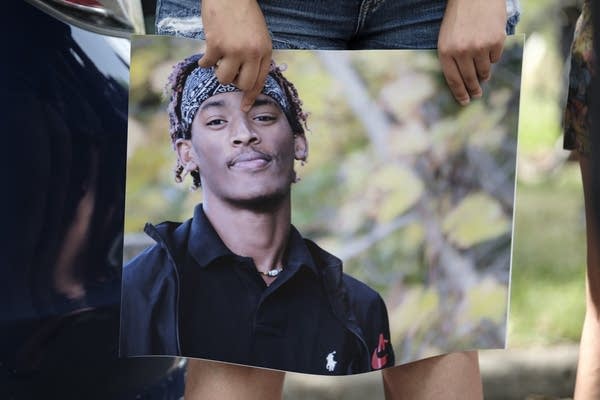
The family filed a lawsuit against the city in July alleging Carlson and other officers were informed that Sundberg had “intellectual and mental health disabilities” but didn’t consult with mental health professionals to help resolve the situation. Carlson is not a defendant, but is referred to in that lawsuit.
Sgt. Garrett Parten, the department’s public information officer, said in a statement that Carlson played a key role in developing and “modernizing” the training curriculum. Carlson manages a team of instructors and administrative staff.
During his 21 years with MPD, Carlson received a Lifesaving Award and Medal of Commendation. In a statement, Parten emphasized Carlson’s numerous certifications and trainings, including from the FBI.
“His decade of SWAT experience, combined with leadership roles as both a Sergeant and Lieutenant, has given him deep operational insight that he now channels into preparing officers for real-world challenges,” Parten said.
Lt. Adam Lepinski accused of pepper-spraying a man for no reason
Lt. Adam Lepinski oversees training for recruits, as well as the field training officer program, and manages the cadet and lateral officer programs. He was assigned an administrative role in the training division this past May, where he also monitors the training curriculum and helps interview new hires.
Lepinski has five unresolved complaints against him dating back to 2022 and 15 that were closed without discipline. Lepinski has been with MPD for 21 years. The median number of complaints lodged against officers who have spent 20 years or more at MPD is six, according to an MPR News analysis of public data.
Lepinski was accused in a lawsuit of pepper-spraying a man from a close distance, without warning or provocation, in 2016. Ryan Carlson alleged that he was exiting a downtown Minneapolis bar when Lepinski sprayed him in the face, temporarily blinding him. He alleged that Lepinski did not offer him assistance.
Carlson claimed that when he asked Lepinski why he pepper-sprayed him, Lepinski handcuffed him and arrested him without justification. Lepinski allegedly cited him for disorderly conduct, but that charge was dismissed.
In a legal reply to the complaint, Lepinski argued he used pepper spray to deliver a “one-second burst to Plaintiff’s facial area in response to Plaintiff’s aggressive actions.” He denied his actions were “unreasonable, improper or wrongful.”
The city settled that lawsuit for $25,000 in 2018.
A decade earlier, a woman alleged Lepinski failed to help her or intervene when another officer allegedly injured her, inappropriately touched her and took $200 from her pocket, according to a lawsuit the woman filed without a lawyer. She alleged that both officers made racist and sexist comments during this time.
The officers denied all allegations against them.
In 2010, the woman agreed to “compromise all of her claims” against the city in exchange for $200 — the same amount of money that she alleged was stolen from her.
Lepinski was assigned to the training division in May 2025, about seven months after Davis Moturi, a Black man, was allegedly shot by his white neighbor, John Sawchak. Lepinski was one of the officers who was responsible for responding to Moturi after months of escalating, racist threats and actions from Sawchak. Sawchak has been charged with attempted murder and was found incompetent to stand trial in April.
An independent review of MPD’s response has not yet concluded.
O’Hara said in a press conference four days after the shooting that the department “failed this victim 100 percent” and had not acted with enough urgency, but rejected accusations that the department did nothing or did not care.

Moturi said in an interview with MPR News that he personally called Lepinski, as well as 911, several times and nobody showed up, or when they did, it was too late. He criticized officers for not waiting outside during the hours he said Sawchak was most likely to leave the house.
Lepinski said in emails that he had conducted surveillance more than 20 times.
Over the course of his career with MPD, Lepinski has been awarded the U.S. Attorney’s Award for Excellence in the Pursuit of Justice, Department Award of Merit, Chief’s Award of Merit, Medal of Commendation and Excellence in Investigation Awards. He’s also received awards for his work in the gun investigations, violent crimes and weapons units, according to Parten’s statement.
Parten emphasized Lepinski’s “diverse operational experience,” which has included leading federal conspiracy and firearms investigations with FBI and ATF task forces, as well as his “deep commitment to officer development.”
Officer Matthew Hobbs named in nearly million dollar excessive force lawsuit
Officer Matthew Hobbs worked in the training division from January 2021 until May 17 of this year, facilitating instruction for recruits and cadets at the Police Academy, according to a statement from the department.
Hobbs has since been reassigned to the team that reviews officer use of force, according to the department.
In 2004, the city paid Michael Polley and his attorney $995,000 to settle an excessive force lawsuit. It was reported to be the largest payout involving MPD at the time.
Matthew Hobbs and his partner Lee Meili had responded to a domestic dispute and confronted Polley the year before.
In the lawsuit, Polley claimed one or both of the officers threw him to the ground and one of them “knee dropped” him in the abdomen, even though Polley had followed their commands.
Polley alleged that instead of getting him immediate treatment as needed, the officers took him to a jail instead, where jail staff called an ambulance.
Polley argued he nearly died during the emergency surgery that followed, and had part of his colon and small intestine removed, leaving him with an 11-inch scar from the bottom of his sternum to his pelvis.
The lawsuit didn’t specify which officer allegedly used force. However, it did contend that neither officer intervened, objected to the alleged misconduct, or reported the injuries Polley sustained while in their custody.
In a separate court filing, the officers denied most of the allegations, including that one of them “knee dropped” Polley and a statement in the civil complaint that said “Polley did nothing to merit this assault” by the officers.
Hobbs has been with MPD for nearly 30 years. For most of that time, he was a patrol officer in the 3rd Precinct. He also spent five years with SWAT and has mentored dozens of new officers as a field training officer, according to Parten.
He said Hobbs is recognized for his “subject matter expertise in defensive tactics and force policy” and is driven by a passion for the job.
Family of man fatally shot by police allege Sgt. Shawn Kelly ‘acted with reckless disregard’
Sgt. Shawn Kelly oversees firearm instruction for sworn and civilian personnel and plays a key role in developing and delivering that training across MPD, according to the department. Kelly was assigned full-time to the unit in September 2022 and has been instructing since 2010.
In 2011, a Black man named Antoine Lee alleged in a lawsuit that he is hearing impaired and that Kelly and another officer beat him after he repeated a question back to the officers. Lee claimed the officers made a racist comment during the 2009 incident, then punched and kicked him before placing him in their squad car and falsely arresting him.
In the city’s answer to the lawsuit, Kelly and the other officer named in the suit agreed they used force, but they denied allegations by Lee that they “severely beat him by repeatedly punching, kicking, and kneeing him about his head, face, and body.”
They also said they didn’t know if Lee was hearing impaired and denied making racist comments and falsely arresting Lee.
That lawsuit settled for $68,000 in 2012.
Kelly is one of four officers currently being sued in federal court over the fatal shooting of Andrew Tekle Sundberg. Sundberg’s family alleged that Kelly “acted with reckless disregard” toward Sundberg by falsely saying that Sundberg intended to shoot police, which they said led to his killing. A city spokesperson said the department’s critical incident review over that shooting has not concluded.
Kelly has been with MPD for 22 years. In that time, he has been awarded the Medal of Valor, Lifesaving Award, Medal of Commendation, Unit Citation Award, Department Award of Merit and twice the Distinguished Service Award. He was named Northeast Minneapolis Community Officer of the Year in 2014, according to the police department.
“Sgt. Kelly’s comprehensive experience, instructional credentials, and leadership make him highly qualified to serve as the department’s Range Master,” Parten said in a statement.
Firearms instructor Jason Schmitt accused of striking man with assault rifle
Officer Jason Schmitt is a firearms instructor in the training division. He was assigned full-time to the training division in May 2021 and has been a firearms instructor since 2015, according to the department.
Schmitt has received 25 complaints during his nearly 28 years with MPD, all closed without discipline. That’s more than four times the median number of complaints lodged against officers who have spent 20 years or more at MPD, according to an MPR News analysis of public data.
Schmitt was part of a SWAT team that in 2007 allegedly beat Dennis Melvin Hill, described in his 2013 civil lawsuit as an “elderly disabled man” with “extreme difficulty walking without a cane.”
Hill alleged the SWAT team pointed “machine guns” at him, slammed him to the ground and handcuffed him after he struggled to follow officers’ orders to walk down steps with his hands raised. Hill claimed Schmitt struck him on the head with his assault rifle as he was handcuffing him.
In a response to the allegations filed in court, Schmitt denied that he struck Hill on the head.
Hill argued he suffered from constant headaches, cuts on his wrist and PTSD after the incident. The city settled that lawsuit for $7,000 in 2014.
In 2002, the city also settled a lawsuit for $7,026 that alleged that in 1999, Schmitt unlawfully arrested Jordan Kushner who, from a distance, voiced disagreement with how officers were attempting to arrest another person. Kushner is an attorney who has filed civil rights lawsuits against police officers.
Schmitt was in the news five years ago, as one of three officers who fatally shot Dolal Idd, a 23-year-old Somali American, in December 2020. Dakota County Attorney Kathy Keena determined their actions were justified because Idd fired first.
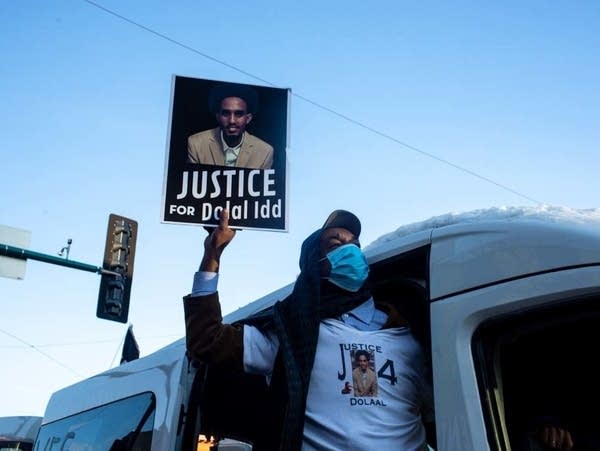
A city spokesperson said the department’s critical incident review of the incident has not concluded.
An ongoing federal lawsuit filed last year accused Jason Schmitt of falsifying a warrant application. Schmitt has testified that he made an unintended mistake.
In a statement, Parten emphasized the “advanced shooting schools and instructor development courses” Schmitt has participated in, as well as the Medal of Honor, two Medals of Valor, the Medal of Commendation, the Award of Merit, the Lifesaving Award and Excellence in Investigation Award Schmitt has received, along with awards for his work in the weapons unit and gun investigations unit.
“This broad and ongoing training background, combined with his operational experience, underscores his qualifications as a highly capable and experienced Range Instructor,” Parten said in a statement.